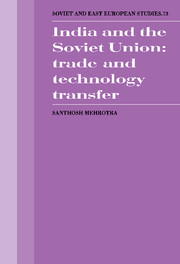Book contents
- Frontmatter
- Contents
- List of tables
- Preface
- List of abbreviations
- Introduction
- PART I
- 1 The Indian development strategy and the USSR
- 2 Indo-Soviet economic relations: geo-political and ideological factors
- 3 Soviet economic interests in non-socialist LDCs
- PART II
- PART III
- Notes
- Bibliography
- Index
- Soviet and East European Studies
2 - Indo-Soviet economic relations: geo-political and ideological factors
from PART I
Published online by Cambridge University Press: 04 August 2010
- Frontmatter
- Contents
- List of tables
- Preface
- List of abbreviations
- Introduction
- PART I
- 1 The Indian development strategy and the USSR
- 2 Indo-Soviet economic relations: geo-political and ideological factors
- 3 Soviet economic interests in non-socialist LDCs
- PART II
- PART III
- Notes
- Bibliography
- Index
- Soviet and East European Studies
Summary
One of the main objectives of the present study is to disentangle the political and economic interests underlying the relationship between the two Asian powers, India and the Soviet Union. As regards the economic relationship, it was suggested in chapter 1 that India's interest in the USSR has shifted ground. In this chapter we attempt to establish the interrelationship between the economic and strategic-political elements of the Indo-Soviet relationship. This is necessary because economic relationships between centrally planned and market economies require the mediation of the state much more than in the case of economic relationships between two market economies.
In section 1 we investigate the basis of the strong mutuality of interests, which has a military dimension to it as well. The military dimension of the relationship not only has an economic significance (i.e. defence imports from the USSR constitute one of the most important categories of Indian imports from the USSR, and defence loans are repaid through exports of Indian goods), it also demonstrates the compatibility of strategic-political interests between the two countries. In section 2 we examine the Soviet view of the Indian state with the objective of understanding the ideological factors underlying the close economic and political relations between India and the USSR. Having thus disentangled the political, economic and ideological factors in the relationship, we attempt to draw together the various strands of the argument in the conclusions.
- Type
- Chapter
- Information
- India and the Soviet UnionTrade and Technology Transfer, pp. 18 - 28Publisher: Cambridge University PressPrint publication year: 1991



